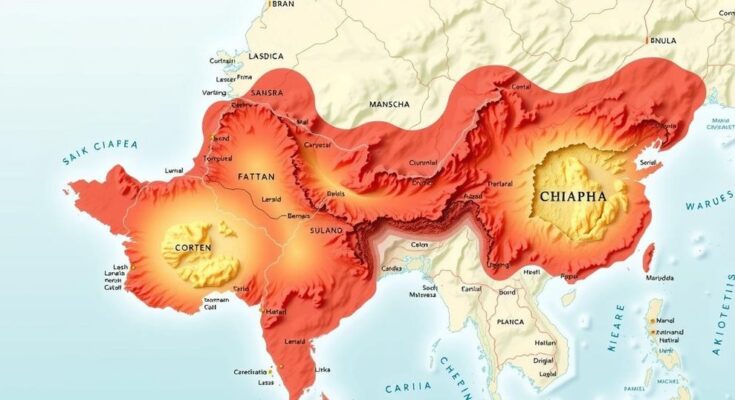Guyana has filed a Request for provisional measures with the ICJ regarding the Essequibo region, citing concerns over Venezuela’s electoral plans for May 2025 which it argues violate its sovereignty. Guyana is seeking to prohibit elections in the disputed territory, prevent annexation efforts, and maintain the current administrative situation. The court’s acknowledgment of this request marks a significant development in the ongoing legal dispute between the two nations.
On Thursday, Guyana submitted a Request for provisional measures to the International Court of Justice (ICJ) regarding its territorial dispute with Venezuela over the Essequibo region. This action comes in response to Venezuela’s announcement of elections scheduled for 25 May 2025 in the contested area.
Guyana’s Request, filed at the Court’s Registry, raises concerns about Venezuela’s electoral activities, asserting that they would infringe upon its sovereignty, territorial integrity, and political independence. The Government of Guyana further claims that these actions breach an earlier ICJ Order issued on 1 December 2023, which called for the maintenance of the status quo in the disputed region.
Emphasizing the urgency of the situation, Guyana warns of irreparable harm resulting from Venezuela’s electoral plans. In its submission, it requests that the ICJ take provisional measures to prevent Venezuela from engaging in any electoral activities within the territory.
Specifically, Guyana seeks the following from the ICJ:
1. Prohibition of any elections by Venezuela in the disputed territory, including the distribution of electoral materials, candidate nominations, establishing polling stations, and appointing officials.
2. Prevention of any actions that would annex or incorporate the region into Venezuela, whether formally or informally.
3. An order for Venezuela to maintain the current situation, which allows Guyana to administer and control the disputed area.
This legal request follows ongoing proceedings between the two nations since the boundary was established by the 1899 Arbitral Award, which delineated the border between British Guiana (now Guyana) and Venezuela. Guyana first approached the ICJ in 2018, seeking a legal ruling on the legitimacy of the 1899 Award and the status of the territory in question.
Venezuela has contested the ICJ’s jurisdiction throughout the proceedings and has declined to participate in several phases. However, the ICJ confirmed its jurisdiction over the case in a 2020 ruling and has upheld its authority to adjudicate the matter, rejecting subsequent challenges by Venezuela, including a ruling in 2023 allowing the Court to proceed with Guyana’s claims.
The dispute heightened following Venezuela’s controversial “Consultative Referendum” announcement in December 2023, proposing the establishment of a new Venezuelan state, “Guayana Esequiba,” which would include the contested Essaquibo region. The ICJ’s Order from 1 December 2023 called for both nations to abstain from actions exacerbating the dispute, particularly those that might alter the territorial situation.
Guyana’s new request for provisional measures seeks urgent intervention from the ICJ to curb Venezuela’s actions in the disputed region. Although the ICJ has not yet responded, acknowledging Guyana’s filing is a significant step in the ongoing legal proceedings.
The outcome of this case is critical for resolving one of Latin America’s enduring territorial conflicts, with both countries holding firm and opposing views regarding the legal status of the Essequibo region.
In summary, Guyana’s recent filing with the ICJ highlights its concerns regarding Venezuela’s plans for elections in the contested Essequibo region. By seeking provisional measures, Guyana aims to safeguard its sovereignty and prevent any actions that may alter the territorial status quo. The response from the ICJ will be pivotal in the continued adjudication of this long-standing territorial dispute between Guyana and Venezuela.
Original Source: newsroom.gy




